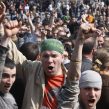
After-Effects of April Clashes Overshadow Moldova’s Electoral Campaign
Publication: Eurasia Daily Monitor Volume: 6 Issue: 129
By:

On July 8 Moldova officially enters the campaign for repeat parliamentary elections, barely three months after holding regular quadrennial elections. The repeat elections are scheduled for July 29, to be followed by the election of a new head of state in the new parliament. The presidency is technically vacant, the parliament is dissolved, and the government serves in a caretaker capacity with limited powers (Moldpres, Basapres, July 1-6).
The violent clashes in April and subsequent confrontation in the aborted parliament are casting a dark shadow over the ongoing campaign for repeat elections. The nominal Communist Party had won the parliamentary elections on April 5 for the third consecutive time, with the European observation mission evaluating these elections (as the preceding ones) positively overall and the outcome as legitimate. The opposition’s three nominal liberal parties, however, forced the holding of repeat elections, exploiting a constitutional loophole to block the election of a new state president in the newly elected parliament.
The opposition parties have never condemned the April 7 riots, when mobs including the opposition’s sympathizers overran the parliament and presidential buildings and set them on fire. The police and security services were caught unawares, failed to protect the state buildings for fear of causing loss of life, and reacted only after the riots by using unlawful, indiscriminate violence. Exacerbating the situation, the authorities appointed a puppet commission to investigate those events. Election-related rioting, previously unthinkable in Moldova, must now be regarded as a potential risk in the campaign’s inflamed atmosphere and particularly in the upcoming election’s aftermath.
Political polarization seems irreparably deep, with both camps striving for maximum mobilization of their respective groups of committed voters. The rhetoric of hate and revanche has reached dangerous levels and could grow even worse during the repeat electoral campaign.
The presidential team remains in the grip of a bunker mentality ever since April 7. Acting President Vladimir Voronin (he serves in an interim capacity pending the election of a new head of state by the new parliament) often loses control of his emotions, language, and manners during his public speeches and interactions with the media. The law-enforcement apparatus is under-resourced and inept.
Voronin and his team have proved unable to cope with the first serious internal security challenge they have ever encountered. Previous challenges to the state-the 1992 Russian military intervention and the 2002-04 "federalization" scheme-were external ones. The events since April have occasioned a crisis of state leadership at the highest political level.
A visibly shaken president, some of his associates and mass media loyal to them portray the three opposition parties as "anti-state," "fascist," and "coup-plotters," part of their un-statesmanlike response to the irreconcilable opposition’s labeling of the authorities as "bolshevik," "criminal," and "usurper," and the twice-elected head of state as "the brute" and "that beast." Such unsettling exchanges, along with threats of retribution, are taking place on a daily basis in the local media on both sides.
Two opposition newspapers had introduced this style already during the 2005 electoral campaign and in its aftermath. At that time, opposition factions (in a different configuration) rejected the electoral outcome and demanded repeat elections despite the European observers’ positive assessment, as if presaging the 2009 events. During the intervening four years, the same newspapers escalated the incendiary rhetoric, turning it into a defining element of Moldova’s political scene. Opposition parties, the Communist Party’s press, and Voronin himself adopted a highly belligerent style after the 2007 local elections, unleashing a process of mutual vilification between the two now-irreconcilable camps. This process is intensifying during the current campaign and could lead to uncontrolled outbreaks of violence again.
The Communist Party’s electoral campaign, however, is being managed more professionally, compared with the presidential institution or the law enforcement apparatus. The most competent presidential advisers are assigned to lead the party’s electoral campaign. With top adviser Marc Tcaciuc fixated on the campaign, his rivals and detractors in the police and procuracy have gained in political influence at the top. Despite their track record of incompetence and sometimes brutality, Voronin has become more dependent on such figures as Internal Affairs Minister Gheorghe Papuc, or Prosecutor-General Valeriu Gurbulea during this dangerous political crisis.
The cabinet of ministers remains non-political and is rated as the most professional ever in Moldova by Western economic and financial officials. The opposition parties cannot match that quality but are campaigning for change at any cost, with potentially detrimental effects on economic governance, if the opposition forms the new government. Meanwhile, the opposition has proved incapable of running the Chisinau municipal council, where nominal liberals have been in charge since 2007. The Communist Party is capitalizing on the opposition’s mismanagement at city level as a salient theme in this campaign.
Whether the country can emerge unshaken from this protracted internal confrontation is far from certain. Moldova’s weak state institutions and its undeveloped multi-party system may prove unable to deal effectively with this unprecedented challenge to the state in its heartland on the right bank of the Dniester. On the left bank, Tiraspol’s secessionist authorities have found a new, potent argument to justify full separation from a Moldova they portray as dysfunctional, unpredictable, and destabilized by pro-Romania opposition parties.
The European Union’s Special Representative for Moldova, Kalman Mizsei, stationed almost permanently in Chisinau since March, has appealed to all political forces to refrain from mutual vilification and conduct a civilized campaign. His statement is urging post-election reconciliation irrespective of the elections’ outcome, for the soonest possible resumption of E.U.-assisted reforms (Moldpres, Basapres, July 3). Mizsei’s high credibility in Chisinau has helped mitigate tensions in the volatile situation there.




